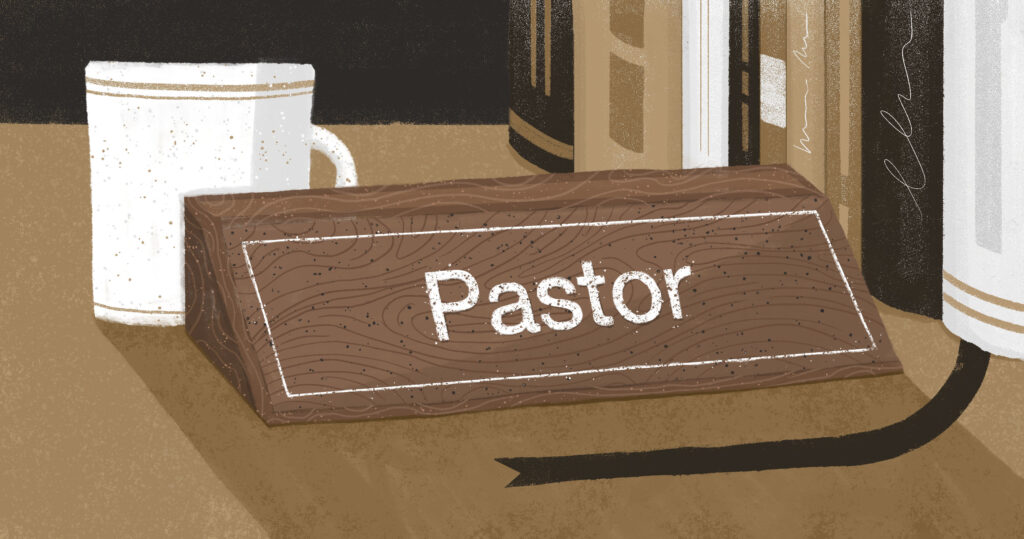When You Let Ministry Turn into Your Id

Headed for Destruction
In ways in which scare me now as I look again on them, I used to be a person headed for catastrophe. I used to be in the course of destroying my marriage and my ministry, and I didn’t have a clue. There was an enormous disconnect between my non-public persona and my public ministry life. The irritable and impatient man at residence was a really completely different man from the gracious and affected person pastor our congregation noticed in these public ministry and worship settings the place they encountered me most. I used to be more and more snug with issues that ought to have haunted and convicted me. I used to be okay with issues as they have been. I felt no use for change. I simply didn’t see the religious schizophrenia that non-public ministry life had turn into. Issues wouldn’t keep the identical, if for no different purpose than that I used to be and am a son of a relentless Redeemer, who won’t forsake the work of his palms till that work is full. Little did I do know that he would expose my coronary heart in a strong second of rescuing grace. I used to be blind and progressively hardening and fortunately going concerning the work of a rising native church and Christian faculty.
There are underlying themes that operated in my life, which I’ve encountered working within the lives of many pastors to whom I’ve talked. These underlying themes functioned because the mechanism of religious blindness in my life, they usually do within the lives of numerous pastors around the globe. Unpacking these themes is an effective option to launch us on an examination of locations the place pastoral tradition could also be lower than biblical and on a consideration of temptations which might be both resident in or intensified by pastoral ministry. Considered one of these themes is the temptation to make ministry your identification.
I Let Ministry Outline My Id
It’s one thing I’ve written about earlier than, however I believe it’s significantly essential for folks in ministry to know. I at all times say it this fashion: “Nobody is extra influential in your life than you’re, as a result of nobody talks to you greater than you do.” Whether or not you understand it or not, you’re in an never-ending dialog with your self, and the stuff you say to you about you’re formative of the best way that you simply stay. You might be continually speaking to your self about your identification, your spirituality, your performance, your emotionality, your mentality, your persona, your relationships, and many others. You might be continually preaching to your self some sort of gospel. You preach to your self an anti-gospel of your individual righteousness, energy, and knowledge, otherwise you preach to your self the true gospel of deep religious want and adequate grace. You preach to your self an anti-gospel of aloneness and incapability, otherwise you preach to your self the true gospel of the presence, provisions, and energy of an ever-present Christ.
Recognizing the widespread struggles going through pastors in the present day, Tripp exposes and exhorts the cultures that prepare and help our church leaders in order that they will lead nicely and our church buildings could be wholesome.
Smack-dab in the course of your inner dialog is what you inform your self about your identification. Human beings are at all times assigning to themselves some sort of identification. There are solely two locations to look. Both you can be getting your identification vertically, from who you’re in Christ, or you can be searching for it horizontally within the conditions, experiences, and relationships of your every day life. That is true of everybody, however I’m satisfied that getting one’s identification horizontally is a selected temptation for these in ministry. A part of why I used to be so blind to the massive disconnect between what was occurring in my public ministry life and my non-public household life was this concern of identification.
Ministry had turn into my identification. No, I didn’t consider myself as a baby of God, in every day want of grace, in the course of my very own sanctification, nonetheless in a battle with sin, nonetheless in want of the physique of Christ, and referred to as to pastoral ministry. No, I considered myself as a pastor. That’s it, backside line. The workplace of pastor was greater than a calling and a set of God-given items that had been acknowledged by the physique of Christ. “Pastor” outlined me. It was me in a means that proved to be extra harmful than I might have thought. Allow me to elucidate the religious dynamics of all this.
In ways in which my eyes didn’t see and my coronary heart was not but able to embrace, my Christianity had give up being a relationship. Sure, I knew God is my Father and that I’m his little one, however at avenue stage issues appeared completely different. My religion had turn into knowledgeable calling. It had turn into my job. My position as pastor was the best way I understood myself. It formed the best way I associated to God. It fashioned my relationships with the folks in my life. My calling had turn into my identification, and I used to be in bother, and I had no concept. I used to be arrange for catastrophe, and if it hadn’t been anger, it could have been one thing else.
It’s no shock to me that there are numerous bitter pastors on the market, many who’re socially uncomfortable, many who’ve messy or dysfunctional relationships at residence, many who’ve tense relationships with workers members or lay leaders, and plenty of who wrestle with secret, unconfessed sin. Might it’s that every one of those struggles are potentiated by the truth that we now have turn into snug with and defining ourselves in a means that’s lower than biblical? So we come to relationship with God and others being lower than needy. And since we’re lower than needy, we’re lower than open to the ministry of others and to the conviction of the Spirit. This sucks the life out of the non-public devotional side of our stroll with God. Tender, heartfelt worship is difficult for an individual who thinks of himself as having arrived. Nobody celebrates the presence and charm of the Lord Jesus Christ greater than the one who has embraced his determined and every day want of it. However ministry had redefined me. In methods I now discover embarrassing, it advised me that I used to be not like everybody else, that I existed in a singular class. And if I used to be not like everybody else, then I didn’t want what everybody else wants. Now, should you had sat me down and advised me all this particularly, I might have advised you it was all a bunch of baloney; however it was how I acted and associated.
I do know I’m not alone. There are lots of pastors who’ve inserted themselves right into a religious class that doesn’t exist. Like me, they suppose they’re somebody they’re not. So that they reply in ways in which they shouldn’t, they usually develop habits which might be spiritually harmful. They’re content material with a devotional life that both doesn’t exist or is continually kidnapped by preparation. They’re snug with dwelling outdoors of or above the physique of Christ. They’re fast to minister however not very open to being ministered to. They’ve lengthy since give up seeing themselves with accuracy and so have a tendency to not obtain nicely the loving confrontation of others. They usually have a tendency to hold this distinctive class identification residence with them and are lower than humble and affected person with their households.
The false identification that many people have assigned to ourselves then constructions how we see and reply to others. You might be most loving, affected person, variety, and gracious if you find yourself conscious that there isn’t any fact that you could possibly give to a different that you simply don’t desperately want your self. You might be most humble and mild once you suppose that the individual you’re ministering to is extra such as you than not like you. When you might have inserted your self into one other class that tends to make you suppose you might have arrived, it is extremely straightforward to be judgmental and impatient. I heard a pastor unwittingly verbalize this nicely.
My brother Tedd and I have been at a big Christian-life convention listening to a widely known pastor communicate on household worship. He advised tales of the zeal, self-discipline, and dedication of the nice fathers of our religion to private and household worship. He painted prolonged footage of what their non-public and household devotions have been like. I believe all of us felt that it was all very convicting and discouraging. I felt the load of the burden of the group as they listened. I used to be saying to myself, “Consolation us with grace, consolation us with grace,” however the grace by no means got here.
Nobody is extra influential in your life than you’re, as a result of nobody talks to you greater than you do.
On the best way again to the resort, Tedd and I rode with the speaker and one other pastor, who was our driver. Our pastor driver had clearly felt the burden himself and requested the speaker a superb query. He stated, “If a person in your congregation got here to you and stated, ‘Pastor, I do know I’m speculated to have devotions with my household, however issues are so chaotic at my home that I can barely get myself off the bed and get the kid fed and off to high school; I don’t understand how I might ever be capable to pull off devotions too’—what would you say to him?” (The next response just isn’t made up or enhanced in any means.) The speaker answered, “I say to him, ‘I’m a pastor, which implies I carry many extra burdens for a lot of extra folks than you do, and if I can pull off every day household worship, try to be ready to take action as nicely.’” Possibly it was as a result of he was with a bunch of pastors, however he truly stated it! There was no figuring out with the person’s wrestle. There was no ministry of grace. Coming from a world this man didn’t perceive, he laid the legislation on him much more closely, as sadly I did repeatedly with my spouse and youngsters.
As I heard his response, I used to be offended, till I remembered that I had finished the exact same factor repeatedly. At residence it was all too straightforward to mete out judgment whereas I used to be all too stingy with the giving of grace. However there was one other factor working that was much more harmful. This unique-category identification not solely outlined my relationship with others but additionally was destroying my relationship with God.
Blind to what was occurring in my coronary heart, I used to be proud, unapproachable, defensive, and all too snug. I used to be a pastor; I didn’t want what different folks want. Now, I wish to say once more that on the conceptual, theological stage, I might have argued that every one of this was bunk. Being a pastor was my calling, not my identification. Baby of the Most Excessive God was my cross-purchased identification. Member of the physique of Christ was my identification. Man in the course of his personal sanctification was my identification. Sinner and nonetheless in want of rescuing, remodeling, empowering, and delivering grace was my identification. I didn’t understand that I appeared horizontally for what I had already been given in Christ and that it was producing a harvest of unhealthy fruit in my coronary heart, in my ministry, and in my relationships. I had let my ministry turn into one thing that it ought to by no means be (my identification); I appeared to it to present me what it by no means may (my internal sense of well-being).
This text is customized from Harmful Calling: Confronting the Distinctive Challenges of Pastoral Ministry by Paul David Tripp.
Associated Articles







